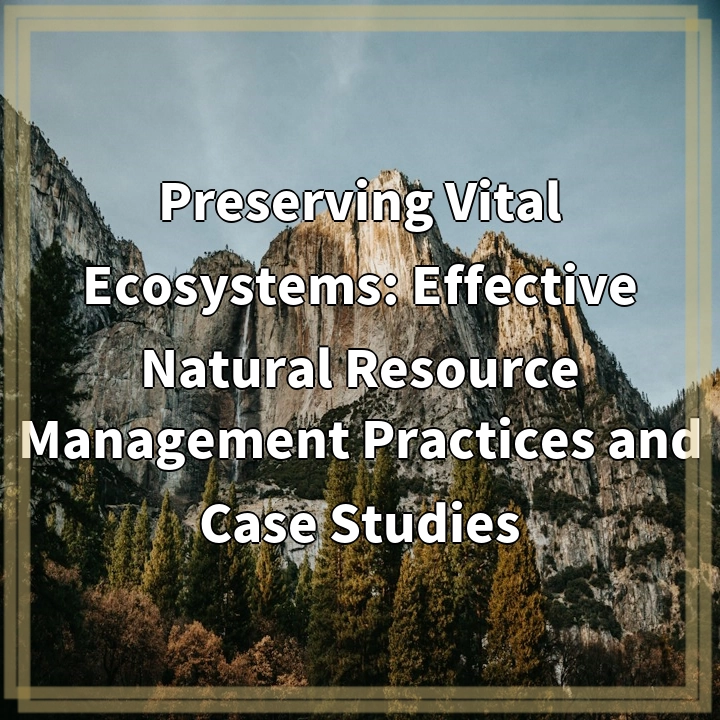
What is Natural Resource Management?
Natural Resource Management (NRM) refers to the sustainable utilization and conservation of natural resources, including land, water, forests, and biodiversity. It involves implementing effective strategies and practices to ensure the long-term viability of these resources while minimizing environmental degradation and providing socio-economic benefits.
Real-World Problems Associated with Natural Resource Management
1. Unsustainable Extraction and Overconsumption
One of the significant challenges in natural resource management is the unsustainable extraction and overconsumption of resources. This includes activities such as excessive logging, overfishing, and the unregulated exploitation of minerals and natural gas. These practices can lead to habitat destruction, loss of biodiversity, and the depletion of vital resources necessary for the functioning of ecosystems.
2. Deforestation and Habitat Fragmentation
The clearing of forests for agriculture, urbanization, and industrial purposes is a critical issue in natural resource management. Deforestation reduces the availability of carbon sinks, disrupts ecosystems, and threatens numerous plant and animal species. Additionally, habitat fragmentation further exacerbates the problem, as it isolates populations and hinders their ability to migrate and maintain genetic diversity.
3. Water Scarcity and Pollution
The mismanagement of water resources poses a significant challenge to natural resource management. The increasing demand for water from various sectors, including agriculture, industry, and domestic use, coupled with factors such as climate change, leads to water scarcity in many regions. Moreover, pollution from industrial activities, agriculture, and improper waste disposal further degrades water quality, affecting both human health and aquatic ecosystems.
4. Climate Change and its Impacts
Climate change poses severe threats to natural resources and their management efforts. Rising global temperatures, changing precipitation patterns, and extreme weather events impact ecosystems, the availability of natural resources, and the livelihoods of communities. It requires adaptive management strategies to mitigate the impacts, reduce greenhouse gas emissions, and enhance the resilience of ecosystems and communities.
Conclusion:
Preserving vital ecosystems through effective natural resource management is crucial for the sustainability of our planet. By addressing the real-world problems associated with resource extraction, deforestation, water scarcity, and climate change, we can work towards creating a more resilient and harmonious relationship between human activities and the natural environment.

Solutions to Natural Resource Management Challenges
1. Implementing Sustainable Practices
Adopting sustainable practices is crucial for addressing unsustainable resource extraction and overconsumption. This involves promoting responsible logging, fishing, and mining practices that consider the long-term health of ecosystems and aim to minimize negative impacts. Implementing quotas, implementing smart farming techniques, and promoting sustainable fishing practices are some examples.
2. Promoting Forest Conservation and Restoration
To combat deforestation and habitat fragmentation, it is essential to promote forest conservation and restoration efforts. This includes strengthening protected areas, implementing reforestation programs, and promoting sustainable land-use practices such as agroforestry. Encouraging the use of sustainable timber and responsibly sourced forest products is also crucial.
3. Ensuring Efficient Water Management
To address water scarcity and pollution, effective water management strategies must be implemented. This includes promoting water conservation practices, investing in water infrastructure development, and implementing policies that prioritize sustainable water use. Additionally, regulating and reducing pollution sources and implementing wastewater treatment technologies can help improve water quality.
4. Climate Change Mitigation and Adaptation
Tackling climate change requires a two-fold approach: mitigating greenhouse gas emissions and adapting to the changes already occurring. This involves transitioning to renewable energy sources, improving energy efficiency, and adopting sustainable land-use practices that sequester carbon. Additionally, enhancing the resilience of ecosystems and communities through climate change adaptation measures is crucial.
Conclusion:
By implementing sustainable practices, promoting forest conservation, ensuring efficient water management, and addressing climate change, we can overcome the challenges associated with natural resource management. These solutions require collaboration between governments, communities, industries, and individuals to create a sustainable future for our planet.















